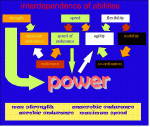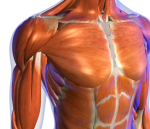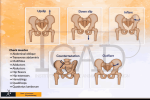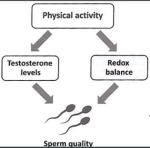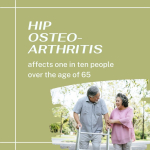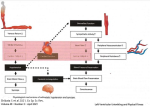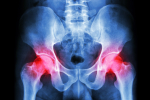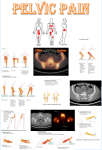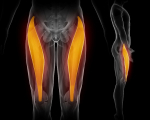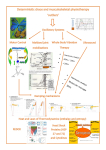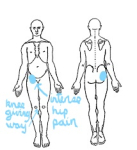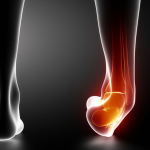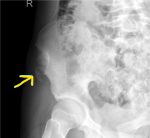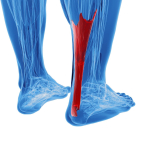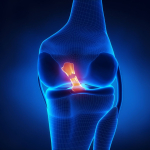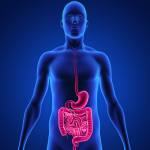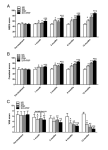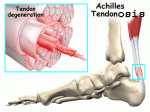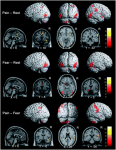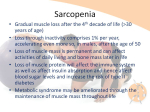Exercise and the gut
by Martin Krause

We've often heard the phrase 'you are what you eat', however, did you know that exercise can have a profound affect on the gut flora, which in turn affects the way we digest our foods?
Regular exercise has been proposed to alter the gut microbiota and gut epithelium. Specifically, exercise has been shown to increase the butyrate-producing taxa and fecal butyrate concentrations and reduce pro-inflammatory cytokines and oxidative stress (Mailing et al 2019, Ex Sp Sc Rev, 47, 2, 75-85).. Further reading on gut biota and exercise
The implications for the gut of regular exercise include affects on
- Colorectal cancer
- Inflammatory bowel disease (IBD)
- Obesity and metabolic disease
- Mental and cognitive health
Cancer
Some observational studies have suggested the physically active individuals have a 24% reduced risk of colorectal cancer (Torii et al 2010, Ann Clin Biochem, 47, 5, 447-452; Wolin et al 2009, Br J Cancer, 100, 4, 611-616). Suggested mechanisms include simple biomechanics of increased abdominal muscle activity, improving intestinal mixing and reduced intestinal transition time through activities as simple as running and walking. Increased bile duct activity, improved circulation due to short term ischaemic regulation, the release of myokines, metabolites, and neurendocrines which interact with the gut directly or indirectly through the gut-immune interface are all considered potential agents in the regulation of cell function. Additionally, increased butyrate production through exercise, which is metabolised in the mitochondria, stimulates the expression of genes involved in cell proliferation and cell turn over, which effectively strengthening the intestinal barrier (Andrianopoulos et al 1987, Anticancer Res, 7, 4, 849-852). Animal studies transplanting gut microbiota from exercised and non-exercised animals showed a more regnerative cytokine profile and higher levels of transforming growth factor (TGF-beta) and interleukin 22 (IL-22) gene expression in the distal colon (Tambaugh et al 2006, Nature, 444, 1027-1031). Read more on Cancer and the Immune System
Irritable bowel disease
Inflammatory bowel disease has been associated with increased abundance of Enterobacteriacae and reduced abundance of Roseburia, factors known to produce butyrate and induce redulatory T-cell formation, which is known to be important for immune function. Additionally, carbohydrate metabolism has been shown to be altered in the gut of people with IBD, whereas people who are physically active have increased SCFA (Short Chain Fatty Acids). Interestingly, positive gut changes in animal studies during voluntary wheel running were NOT replicated in forced treadmill running (Allen et al 2015, 118, 8, 1059-1066). Animal studies transplanting gut microbiota from exercised and non-exercised animals showed a more regnerative cytokine profile and higher levels of transforming growth factor (TGF-beta) and interleukin 22 (IL-22) gene expression in the distal colon (Tambaugh et al 2006, Nature, 444, 1027-1031).
Obesity
Obesity and metabolic disease has been shown to be related to gut microbiota in a seminal paper by Tumburgh et al (2018, Gut Microbes, 9, 2, 115-130) where they placed gut microbiota from obese mice into healthy mice and noted rapid weight gain.
Read more on Exercise and Obesity
"I have a gut feeling" "Exercise your mood"
The existance of a gut-brain axis has been well established, whereby gut microbiota affect the vagal nerve receptors. Certain gut microbes are capable of producing neurotransmitters such as serotonin and GABA. GABA is the chief neuro-inhibitor in the central nervous system and typically has an anit-anxiety and relaxant affects, whereas serotonin is associated with mood and depression. Both substances can be derived from Lactobacillus species (Carabotti et al 2015, 28, 2, 203-209). People with depressive or anxiety disorders have a unique and predictive gut profile with increased plasma levels of markers associated with intestinal permeability (Stevens et al 2018, Gut, 67, 8, 1555-1557). Butyrate seems to increase neuroplasticity and has anti-depressant activity, boosting brain serotonin levels (Matt et al 2018, Front Immun, 9, 1832)
Uploaded : 9 May 2019
Updated : 30 July 2021





